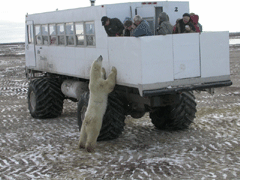Early Signs: Reports From a Warming Planet
|
|
Tundra Buggies cart tourists over the tundra to oversee the bears as they bide their time waiting to get back on the ice. Sometimes the bears observe them, too. (Photo: Nick Miroff) |
PART I
Living on Earth kicks off a six-part series of reports from places where climate change concerns are already bringing change. First stop: Churchill, Manitoba where Nick Miroff and Jon Mooalem report diminished polar ice is forcing a town to reexamine whether it has any future as "The Polar Bear Capital of the World."
PART II
In the second of a series on climate change, Living on Earth travels to East Africa. The waters of Lake Tanganyika have warmed in recent years. Now some scientists are worried that that could be affecting a small fish that's a staple food for Tanzania. Jori Lewis reports.
PART III
In the latest in a series of reports from places where concerns about climate change are already having an impact, reporter Ali Berzon traveled to New Zealand. Residents of the Pacific Island nation of Tuvalu have been moving there, and some consider themselves the world's first climate refugees.
PART IV
This week we travel to the Ecuadorean Andes, to a snow-covered mountain that has been the source of legend for centuries. Now the glacier has melted, and the region's native people try to cope with a warmer, drier, world.
PART V
For low-lying coral islands in the South Pacific, the warming of the planet and its atmosphere is not an abstraction, it's a reality. In the fifth in a series on early signs of climate change around the globe, Aaron Selverston reports from the island nation of Kiribati (kiri-bahs).
PART VI
When scientists discuss countries at risk from the potential effects of climate change, they point to Bangladesh. Just above sea level, and in the flood plain of the Ganges and Brahmaputra rivers, 144 million people live in a space the size of Wisconsin. Producers Sandhya Somashekhar and Emilie Raguso report on what's at stake for Bangladesh.
PART VII
You may have heard "The Snows of Kilimanjaro" are fast disappearing. It turns out, so are the forests. Reporter Kate Davidson spent time with scientists and local farmers in Tanzania to look at the combined effect of tree-cutting and climate change in this installment of the series Early Signs: Reports from a Warming Planet.
PART VIII
Over a relatively short time, understanding the Earth's climate history has become one of the most happening areas of scientific research. In New Zealand, climate researchers are trying to glean climate knowledge from the country's original inhabitants, the Maori. Durrell Dawson reports some of these researchers are Maori themselves, and that gives their work a certain poignance.
 |
 |  |  |
Back to the series and features homepage
Living on Earth wants to hear from you!
Living on Earth
62 Calef Highway, Suite 212
Lee, NH 03861
Telephone: 617-287-4121
E-mail: comments@loe.org
Newsletter [Click here]
Donate to Living on Earth!
Living on Earth is an independent media program and relies entirely on contributions from listeners and institutions supporting public service. Please donate now to preserve an independent environmental voice.
NewsletterLiving on Earth offers a weekly delivery of the show's rundown to your mailbox. Sign up for our newsletter today!
 Sailors For The Sea: Be the change you want to sea.
Sailors For The Sea: Be the change you want to sea.
 The Grantham Foundation for the Protection of the Environment: Committed to protecting and improving the health of the global environment.
The Grantham Foundation for the Protection of the Environment: Committed to protecting and improving the health of the global environment.
 Contribute to Living on Earth and receive, as our gift to you, an archival print of one of Mark Seth Lender's extraordinary wildlife photographs. Follow the link to see Mark's current collection of photographs.
Contribute to Living on Earth and receive, as our gift to you, an archival print of one of Mark Seth Lender's extraordinary wildlife photographs. Follow the link to see Mark's current collection of photographs.
 Buy a signed copy of Mark Seth Lender's book Smeagull the Seagull & support Living on Earth
Buy a signed copy of Mark Seth Lender's book Smeagull the Seagull & support Living on Earth


